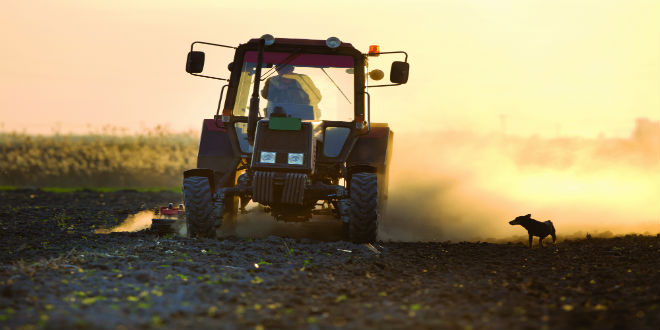Mar 6, 2018MSU Ag Innovation Day: Focus on fruit, vegetable technologies
Consumers and the farmers who grow the produce they eat want similar things: sustainably and safely raised fruits and vegetables. That’s why Michigan State University (MSU) is bringing together experts to share how new technologies in spray, water, high tunnels and drones, and new strategies for pollinators and disease and insect management will change the shape of the industry, exceed consumer expectations and improve growers’ bottom line.
“Each year, MSU Agriculture Innovation Day focuses in-depth on a different aspect of Michigan agriculture,” said Ron Bates, director of agriculture and agribusiness for MSU Extension. “The event rotates to various locations throughout the state to give farmers access to the experts who can help them improve their bottom line while maintaining environmentally sound practices on their farms. This year we are pleased to feature new technologies in fruit, vegetable and grape production.”
The third annual MSU Agriculture Innovation Day: Focus on Fruit and Vegetable Technologies will take place June 28 at the MSU Southwest Research and ExtensionCenter at 1791 Hillandale Road in Benton Harbor, Michigan. The 2018 event will begin with registration at 8:30 a.m. and wrap up around 5 p.m. The event is free and includes lunch.
The morning program will focus on topics affecting the overall fruit and vegetable industry:
- The Latest Buzz about Bees. Incorporating non-crop flowers can improve health and reproductive potential of managed and wild bees that pollinate fruits and vegetables.
- Create Your Own Climate Change with High Tunnels. High tunnels can create microclimates that increase production and reduce weather impacts in vegetables, berries, wine grapes and tree fruits.
- Drone Technologies: What Growers Need to Know. Drone and sensor technologies can assist in crop management. Growers will see firsthand the differences in technologies to assess the best technology for their operations.
- Optimizing Sprayer Coverage. New technology can optimize sprayers for better coverage, less waste, and maximum pest and disease control.
- Getting the Most from Your Irrigation Inputs. Adjusting irrigation strategies can ensure efficient water application to maximize production and minimize economic inputs while protecting ground- and surface water.
During the afternoon, producers will have the opportunity to choose from three tracks focusing in-depth on vegetables, fruit or grapes.
Vegetable focus
- Making Cover Crops a Priority. Incorporating diverse cover crops into vegetable production systems at various times throughout the year can maintain and build soil health.
- Managing Diseases for Higher Profitability and a Safer Environment. Management strategies are available to tackle Phytophthora capsici, a persistent soil mold that kills plants and causes fruit rot.
- Insights on Fine-tuning Your Vegetable Irrigation. Comparing nutrient flow and potential movement in soil using various drip systems and soil moisture sensors can improve water use efficiency.
- Niche Market Vegetables: High Tunnels, High Yields. High tunnels enhance productivity and increase harvest windows and crop quality for warm-weather vegetables and cut flowers.
Fruit Focus
- Precision Management of Tree Fruit Orchards: Integrating bio-regulators, predictive models and technology. New tools are available to manipulate plant development, vegetative growth, and fruiting to improve efficiency and profitability.
- Taking a Narrow View: Precision Stone Fruit Orchards. New stone fruit production technologies include improved varieties with bacterial spot resistance, potentially dwarfing rootstocks, fully or partially mechanized orchard tasks (such as mechanized blossom thinning, hedging and worker/picker platforms), and climate modification.
- New Techniques for Outwitting Insect Pests in Tree Fruit Orchards. New tactics that manipulate insect behavior can create improved and environmentally sound insect pest management in orchards.
- Can High Tunnels Make Berry Growing More Profitable? High tunnels can make berry growing more profitable by using multirow integrated systems to improve production and labor efficiency.
Grape focus
- Tuscany on Lake Michigan: High Tunnels and Wine Grapes? High tunnels can open up new possibilities for fully ripening classic, long-season, cold-hardy vinifera wine grape varieties such as Nebbiolo and Petite Verdot.
- Canopy and Cluster Zone Management. Mechanical removal with compressed air can serve as a practical canopy management tool that can result in incremental reduction in rot and vineyard management costs.
- Vineyard of the Future. MSU’s vineyard of the future study looks to increase the efficiency of Concord vineyards using rootstocks, new training systems and mechanical pruning strategies to increase yields.
- Vineyard Mechanization. Mechanization of traditionally manual tasks in vineyards can reduce labor costs and maintain grape quality and vine health.
For detailed session descriptions, visit http://www.canr.msu.edu/msu_agriculture_innovation_day/ or contact Ron Bates at [email protected].















